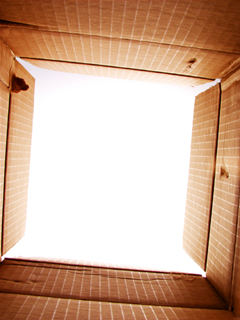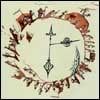I've been called many things in my life. Weirdo. Freak. Nerd. Geek. When I was younger, many of the people I encountered couldn't pronounce my name, Shalvi, and would call me Shelby, which to me sounds like a nice name for a dog. I had one friend in high school who just gave up and decided to call me Al. Sometimes these names got on my nerves, but none of them bothered me as much as being called the "O" word.
Orthodox: conforming to established doctrine of beliefs, ideas or activities; considered traditional; of, pertaining to, or conforming to beliefs, attitudes, or modes of conduct that are generally approved; canonical; conformist; conservative; conventional; doctrinal.
There is much more than meets the eye Sorry man, you got the wrong guy. That's just not me. I was never old school anything. When I began my spiritual search I was looking for a way to connect to something greater than myself—to make some sense of this huge, infinitely intricate universe. I was wearing over-patched tie-dyed jeans, had purple hair, a black leather jacket with plenty of metal, and purple painted combat boots. Orthodox? I don't think so!
I don't mind being called observant, as I think it is a much more appropriate word for a person striving to live a G‑dly life. When a person carefully observes the world around her, and looks for a uniting factor, a purpose, such an observant person is likely to also strive to observe mitzvoth, the Torah's commandments. This is not so offensive.
I still wish that the need to put people in boxes was not so great. I, being human, understand the desire to make sense of the world around me, but there is something about labeling people that I find very distasteful. This may partly have to do with being raised in the generation that was told "politically correct" bedtime stories, but I think that it's more than that. The Torah teaches that Adam "knew" Chava his wife. This isn't just a cute Biblical euphemism. He really did know her. In the Garden of Eden it was possible to fully experience each other, including all of the levels of intellect, emotion and soul. This is what knowing someone means. In our existence outside the garden, how many people can we say that we know? How many of us even know ourselves? We say that we know so and so, but really, honestly, what do we know? Bob? Tall, brown hair, friendly, a lawyer, yeah, I know him. Come on.
In Hebrew the word used for knowing a person is makir, which could be loosely translated as "being familiar". When you say that you have some familiarity with a person there is an understanding that while you recognize him on some level, you know that there is much, much more than meets the eye. When you care deeply about someone, you are able to give her room to be infinite. Besides giving others emotional breathing space, this also makes relationships a lot more interesting!
Besides my issue with names and boxes, there is something about the term Orthodox itself that I find deeply disturbing. I have always been a creative person. When I was little it was arts and crafts, clay and glitter. Then came piano, trombone, tuba, a guitar. In high school I got into sewing, creative writing, and composing. However, none of the above satisfied my creative side as deeply as a real Torah experience, like the times when I was reading a holy book and began to wonder, "Did he write this specifically for me? How could he have known in such detail what I experience? Did the fact that he wrote this two hundred years ago have some influence on my soul and affect how my life would play out?"
When you learn a little bit here, then read something else there, then see an article from the New York Times that demonstrates something that the Torah discussed a couple thousand years ago, and then you get a chance to actually put it into practice—now that's creativity. You are creating yourself! You are creating a more G‑dly world. What a joy and a pleasure it is to learn, write, teach and share, and to become a part of the deep creativity of others as well.
The term 'Orthodox' clearly denotes something very outdated. People who use the term see those who live the Torah as some sort of living-breathing-museum-ancient-artifact. While they may feel that such a preservation of history is something to be respected, they are missing the point completely. The Holy Arizal, the sixteenth century Kabbalist from Tsfat, was known to be able to see and understand the souls of everything surrounding him. Whether it was a rock, an alley cat, or one of his students, he understood the spiritual progress all things had undergone since the time of creation. He emphasized in his writings that things never stay the same. The Tisha B'Av (fast of the Ninth of Av) that we experienced last year or the year before will not repeat itself this year. While we will observe the same laws of mourning and read the same kinot (the special poems recited on Tisha B'Av), we are not the same people. The world is not the same world it was last year. We are one year further from creation and closer to redemption. There are spiritual processes and tikkunim, rectifications, going on that are far beyond our awareness—and sometimes we get a glimpse.
This idea was really brought home to me on my second experience of Tisha B'Av in Israel with more Torah awareness. The first year I had spent a lot of time reading, learning and preparing for the holiday. I had been living in the Old City of Jerusalem, and it all felt very near and real. That year it all seemed to be about rebuilding the Temple within ourselves, filling our lives with holiness, making our homes and lives a sanctuary for the Divine. All of the classes and discussions that year seemed to revolve around receiving the presence of G‑d. I, too, felt something special the afternoon of the fast, standing beside the Western Wall, the last remnant of the most spiritual structure in the world, surrounded by other Jews yearning, crying and praying for the return to Zion. It felt so fabulously close!
When the second year rolled around I thought I was all set, "Here I am, the Tisha B'Av expert! I know all about this holiday, I learned about it last year!" It didn't occur to me that it might be different this time. We've been commemorating it for almost two thousand years. What could have changed? I felt a bit disoriented that year when the Three Weeks did roll around, and nobody was talking about rebuilding the Temple within. That year it was all about the baseless hatred that was the cause of the destruction and is still rampant among us, and the importance of being conscientious in our personal relationships with others. The Tisha B'Av that I knew all about didn't happen that year. It was a new one—and a new one has happened every year since then. The more I invest in preparing physically and spiritually for each upcoming holiday, the more I feel the creativity of it and how it is continuously creating me. So much for a living history museum!
Besides the problem with the idea of labels in general, and the inappropriateness of the term "Orthodoxy" to a lifestyle that is itself a growth form, there is also the issue of the personal limits the term creates. When I first wanted to come closer to Torah, it was a long shot given the life I was living at the time. I started with one mitzvah that I felt comfortable with, saying Shema at night. Each night before I went to sleep, I would take out a little siddur, the prayerbook that my mother had given me, and my father had inscribed, when I was about five. I would say Shema, and the verses following it. I felt a certain holiness in my little nightly ritual. Though the rest of my day was very distant from spirituality, those few minutes every night gave me a sense of direction and connection that was very precious to me-probably to G‑d, too.
Some time later I decided that I wanted to try to keep Shabbat. At the time, I knew nobody in the city who traditionally observed Shabbat. I tried to convince the guys from my rock band that we should practice on Sunday, or some afternoon during the week. After a number of fruitless conversations, it became clear that their schedules would only allow for a Saturday practice. Being that we had booked a gig with a club in a few weeks time, I gave in, but I did decide that I would buy the train ticket before Shabbat. I wouldn't turn on or off any lights, or go out to lunch with the guys afterwards. Although I would be traveling and playing my trombone, it was more of a Sabbath observance than I was used to. I went ahead with my plan. My friends thought I was a weirdo and a geek, and told me so between Salty Rain Blues and Summer Sunday. I felt like a weirdo and a geek. I wasn't acting like one of them, and I clearly wasn't "Orthodox." What in the world did I think I was? Being some sort of bizarre spiritual renegade was beyond the muscles of my soul at that point, so I gave up. My spiritual quest was effectively put to the side. I didn't try to keep Shabbat again until much later, when I was already living in Israel.
Maybe if it hadn't been all or nothing, maybe if the label "Orthodox" was not part of my vocabulary, I would have had the spiritual fortitude to say something like, "Listen, man, I'm on a G‑d trip. If you don't like it, get lost!"
But I didn't. I wasn't able to see the value of a single moment of connection. If I wasn't "Orthodox" it wasn't happening. What a shame.
In today's world, living a life filled with G‑dly strivings is hardly orthodox—
conforming to beliefs, attitudes, or modes of conduct that are generally approved.
You've got to be a hard core, stick to your guns rebel to stand up to all that falls in your way.
















Join the Discussion